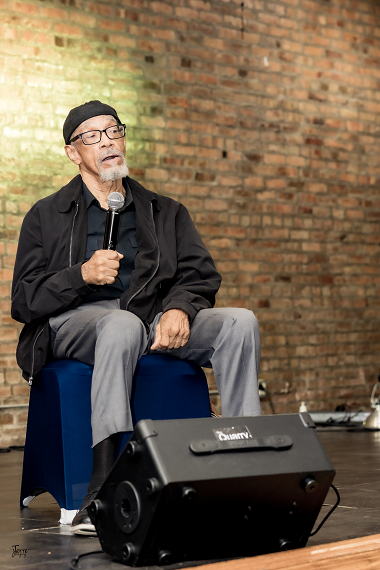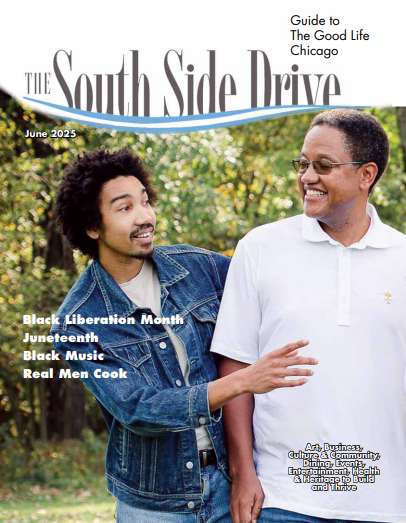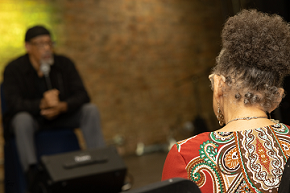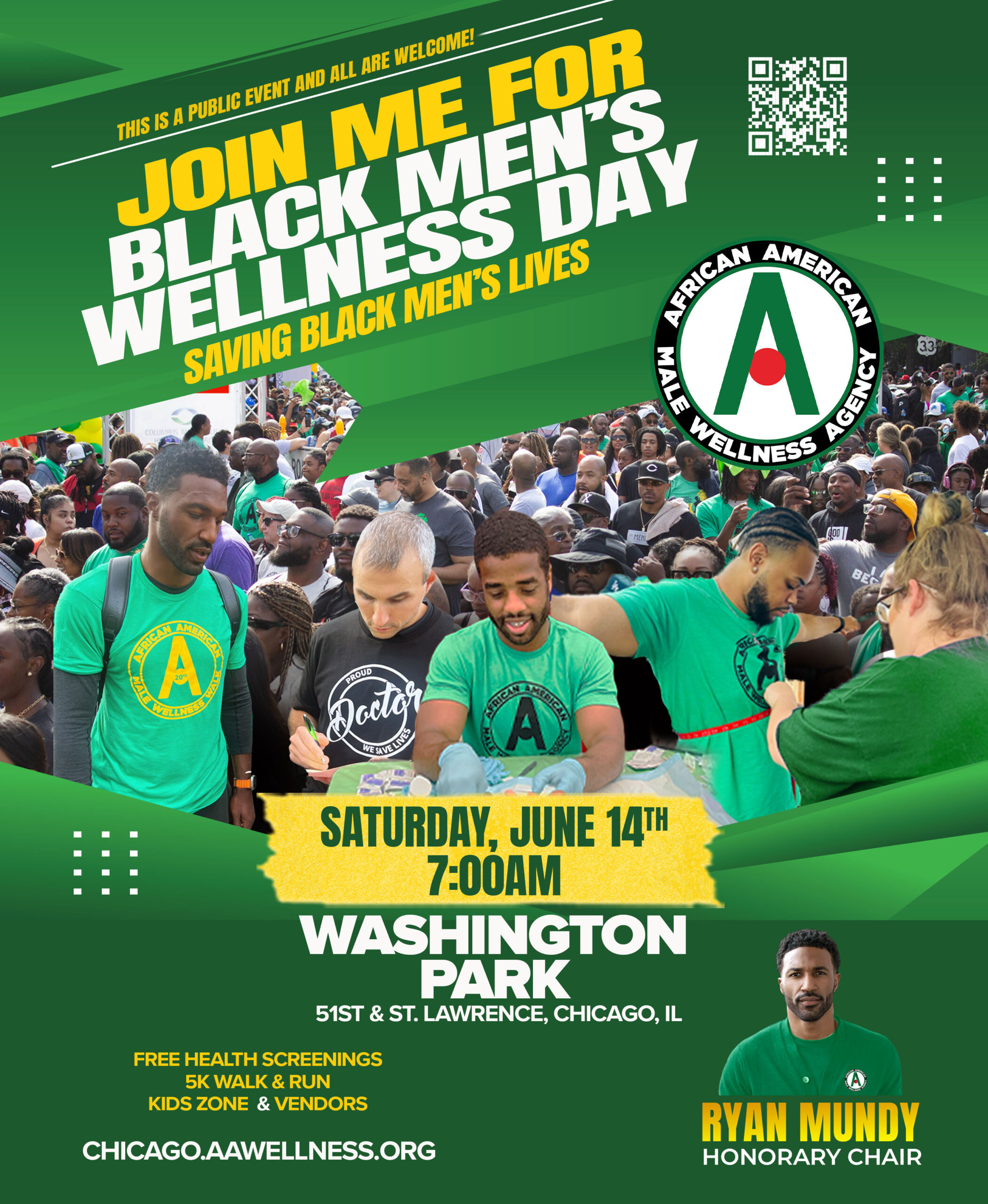Even with a bullet stuck near his spine, the young brother, upon release from the hospital, went to the Black Panther Party headquarters in Jersey City, New Jersey, for immediate enlistment. The bullet, which entered his abdomen, would reside inside him for the next 48 years before exiting in 2021 and becoming a souvenir at his house.
When explaining the events that provoked the shooter, the young brother, now a sage 70 something, cited his unapologetic Black consciousness. “I was antagonizing a white (business) owner, and I should have known better,” he said, when discussing what happened that day in Warner Robins, Georgia. “I was railing against his whiteness and the way he was treating me. And he said, ‘Well, if you don’t like that treatment…take THAT!’ ”
This story, along with details about interactions with Elijah Muhammad, Black Chicago, and Idi Amin, comprised “Wisdom of the Elders, featuring Salim Muwakkil,” the gentleman whose shooting is referenced above. Sponsored by South Side Drive magazine and Real Men Charities and held at the Quarry Event Center, this 70-minute conversation also addressed Dr. Martin Luther King, Jr., Black nationalism, and South Shore’s transformation.
Muwakkil, who hosts a Saturday night talk show on WVON, has also been an editor and writer for Muhammad Speaks, In These Times, the Chicago Tribune, and numerous other publications. Born 77 years ago in Harlem as Alonzo Cannady, Muwakkil has also written for the Associated Press (AP), worked as a Radio Information Officer for the Air Force, and studied Political Science at Rutgers University. He also authored Harold! Photographs from the Harold Washington Years.
When recalling his race consciousness awakenings, Muwakkil cited Malcolm X, whose headquarters were located in Harlem. Having experienced the 1964 Harlem race riots, Muwakkil and many other youths like him embraced Malcolm’s rhetoric, which they found more enticing than Dr. King’s. “There was a difference between the Martin Luther King, dungaree-wearing, country, ‘We Shall Overcome’ folks and Malcolm X, who said, ‘We should have overcome yesterday,’ ” Muwakkil recalled. “Much of my activist life began with just seeing him on stage and being impressed by his presence. The man was articulate…precise…audacious. To us, that represented something that was like a tonic.”

Several years later, as a Black Panther Party member, Muwakkil noticed two contrasting realities: the Party’s character weaknesses and another black activist group’s presence and precision. While Panther demonstrations were scheduled, then canceled, due to members’ irresponsible lifestyles, the Nation of Islam (NOI) members carried themselves with a different, dignified demeanor.
“I understood right then what the Nation of Islam was trying to do: reform us from the inside out,” he said. “That was the formula we needed to follow.” After leaving the Panthers and joining the NOI, Muwakkil would divide his time and talents between two places in Newark. “I was writing for the Associated Press during the day,” he said. “I would then go home at night and transform myself into a raging, Black Muslim and write for Muhammad Speaks.” This duality continued even when he covered the May 2, 1973, confrontation between Assata Shakur and the New Jersey State Police. Muwakkil, who knew Shakur from the Panther Party, wrote with what he called an insider’s perspective. The AP editor removed certain sections, he said, while Muhammad Speaks published the story in its entirety.
(Shakur escaped from a women’s prison in 1979, six-plus years after being charged with murdering a state trooper. What really happened, according to her website, is that she “was pulled over by the…police, (and) shot twice…” Upon her escape, Shakur fled to Cuba, where she, as of this writing, still lives.)
Muwakkil’s writing earned respect from his editor and resulted in an unexpected phone call to his home. “I heard you would like to work (full time) for the Nation,” the caller stated. “I almost fainted,” Muwakkil recalled, stunned that NOI leader Elijah Muhammad had called him personally. He did, however, stay alert enough to confirm. “I said it in the best way with whatever voice I had left.” “Well, we’re waiting for you,” Muhammad replied. “Come on”.
South Shore/Black Chicago, 1973 and Beyond
Muwakkil’s move to Chicago from New Jersey and his new apartment, located at 71st and Yates, were made possible by the NOI. While South Shore is now majority black, the population and mood at that time were quite different.
“(My family) got here in ’64, and that was when it was very dangerous to come here. We could not come to Yates,” said Yvette Moyo, South Side Drive Publisher and discussion’s host. “My brother… got his nose broken for being in the park too late.” Sasha Daltonn, a vocalist who created the Chicago Gospel Music Festival and creator and star of the one-woman show “Sasha Sings Dinah!” added that her group, the Dorsey Gospel Choir, marched from 67th to 71st streets in 1985 to celebrate a “new” South Shore.
“Many of the choir members were seniors, and these ladies were shouting and crying, because they never thought they would see the day South Shore Drive would be opened up for Black people,” she said, from her seat in the second row.
“Black people couldn’t come under the viaduct to Everett (Avenue), unless we were doing daywork.” Moyo then asked Muwakkil about what he first witnessed as a Chicagoan. “What was the fabric of Black culture?” she asked.
At that time, he recalled, the NOI wanted to purchase the South Shore Country Club and convert the facility into a hospital for its own use. The conversations about this possibility resulted in him meeting two other organizers he respected, Raynard Hall and Harold Lucas.
Black Chicago’s organizing efforts, he added, have always been impressive. “I don’t know if it’s the Southern tradition in Chicago that has a more communal feeling to it,” he said. “That communal feel has been urbanized out of New York to a great extent. That’s one of the first things I noted.”
Exits and Excursions
Muwakkil resigned from Muhammad Speaks in 1977 due to philosophical differences with Warith Deen Mohammed, who succeeded Elijah Muhammad, his father, as NOI leader. (Muwakkil had also adopted his current name in 1975.) The Islam advocated by Mohammed, he said, “became much more akin to orthodox Islam, the Islam practiced in the East.” In response, he would align himself with Minister Louis Farrakhan, who had started a new NOI group whose Black nationalist beliefs mirrored Elijah Muhammad’s.
Muwakkil took numerous trips to Africa with the NOI. (His prolific world travels prompted Emma Young, the discussion’s moderator and this publication’s managing editor, to dub him, “The Black Forest Gump.”) In Uganda, he would meet Idi Amin. Upon meeting the country’s president at a pool, Muwakkil noticed his stature a reported 6’ 4” and a proudly displayed, gallon-sized gut.
“When (Ugandans) had big stomachs, they would show them off. It meant they were well fed,” he said. “And when he dived in the water…not a splash! He just glided in the water. Me and Farrakhan looked at each other, like, ‘Look at this cat!’” Muwakkil also addressed the historical negatives documented from Amin’s reign.
While he believed Amin’s reasons for expelling Asian people from Uganda were justified “They were really exploiting the economy,” Muwakkil said his methods were wrong. “He did it in a brutal, cruel way, and he exploited divisions that he shouldn’t have,” he said about Amin, also known as “The Butcher of Uganda.” (During his reign, more than 300,000 people were killed at his command, according to history.com.) “He wasn’t sophisticated enough to handle things, but at the same time he had the best motives for his people.”
During the question-and-answer session, Hunter Adams, a neuroscientist and author, wondered how Muwakkil would compare Amin’s mistakes to those made by Libyan ruler Muammar Gaddafi. After noting that the two leaders’ styles did not compare, Muwakkil referenced Tropical Storm Daniel. This cyclone, which happened on September 10, 2023, in Libya, killed more than 4,000 people. According to UNICEF, more than 8,000 people are still missing.
“Muammar Gaddafi was dedicated to infrastructural improvement. That’s the one thing you can lay at the feet of President Obama,” Muwakkil said. “He’s the one that got rid of Gaddafi, and we see the results of that. Gaddafi…had some problems, but for the most part, he was a ray of hope.” Muwakkil and Adams both noted that the former president expressed regret about Libya’s struggles after Gaddafi’s October 20, 2011, murder.
When speaking about this situation to FOX News months before his second term ended, Mr. Obama said: “Probably failing to plan for the day after, what I think was the right thing to do, intervening in Libya.”
Why “Wisdom…” Exists…
Muwakkil’s appearance in the “Wisdom of the Elders” series was preceded the month before by “Brutha Hood,” who founded the Hood Hope Movement. Hearing from the elders, Moyo explained to the audience attending the Muwakkil session, is essential for preservation.
“We understand that our voices matter,” she said. “If we don’t tell our stories ourselves, they will be distorted, and our children will never know our greatness.”






